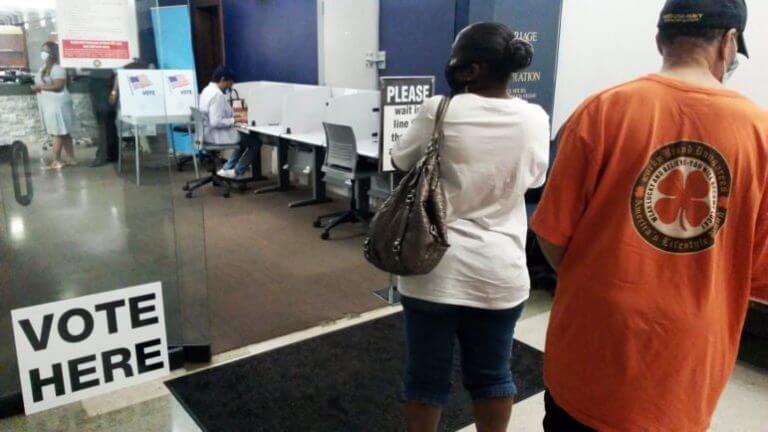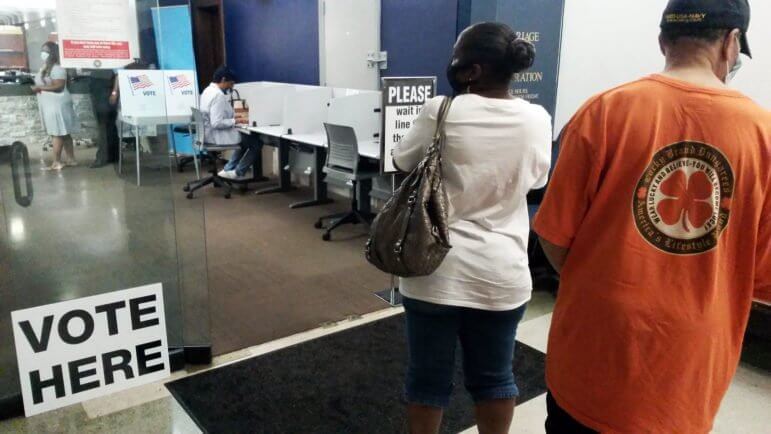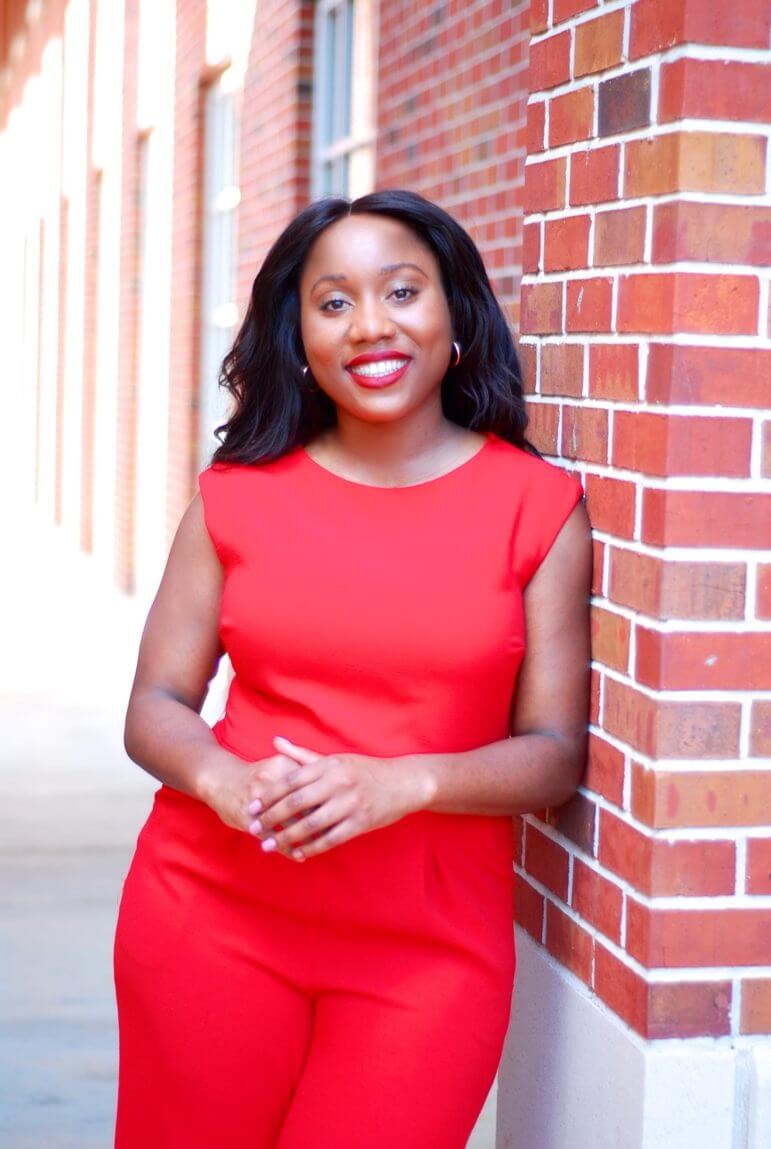

Vickie D. King/Mississippi Today
“We’re getting our votes in early and getting it done,” said Irish Simmons, with her brother Tyrone Mayes, at the Hinds County Courthouse on Tuesday. “Don’t know what this weather is going to be like,” said Simmons.
Inside an at-risk voter’s journey to ensure safe voting conditions in her Delta town
Jackie Lucas is a lifelong voter who had concerns about voting in her small Mound Bayou precinct during the pandemic. When she tried to work with elected officials to change it, she encountered systemic dysfunction at every level.
By Kelsey Davis Betz | Oct. 15, 2020
MOUND BAYOU — Jackie Lucas has never missed a vote. The state of Mississippi has never made it so difficult for her to do so. That is, until the pandemic hit.
Lucas, a Black senior citizen with diabetes, did not feel safe voting in her small, enclosed voting place at Mound Bayou’s city hall. Her town is known for its civic engagement; it’s not unusual for folks to sit shoulder-to-shoulder while waiting to cast a vote.
According to precinct voter population estimates based on the 2010 census, Mound Bayou’s voting precinct serves 1,965 people, which is about 70% higher than the state’s average precinct.
“We just don’t have space there to do any kind of distancing,” Lucas said.
She also didn’t feel confident that the president wouldn’t try to undermine her absentee vote.
The most logical solution she saw was to work with her elected officials to move the voting location from the small city hall to the spacious high school gym less than half a mile away.
She eventually prevailed, but not without jumping through multiple hoops and first hearing from every elected official she asked that there was nothing they could do.
About 64 days before the election, Lucas reached out to Shelia Perry, her county election commissioner, to discuss changing Mound Bayou’s voting location, but said she never heard back. Lucas then heard from the Mound Bayou mayor that Perry had reached out and said nothing could be done.
Indeed, Perry told Mississippi Today that she reached out to the Mississippi Secretary of State’s office for guidance, but says she was told that voting locations must be changed 90 days before an election.
In all, Lucas sought help from her mayor, election commissioner, the board attorney for the election commissioners and her state representative.
While some of them genuinely tried to help her come up with safer, alternative voting solutions, none of them knew that there was actually no law binding polling places to be changed by a certain amount of time before an election.
Even Gov. Tate Reeves, when asked for clarity about what the process was to change a voting location, did not know the answer.
“I’ll be honest with you, I’m not an expert on election law,” Reeves said. “If it is 90 days, and this was a major issue in a county, we’ve had the coronavirus here in the county for a while now. We knew that elections were coming up in November.”
This was something Lucas heard while trying to get her voting location changed — not just that she was out of luck, but that she should have thought of this sooner.
“I asked Mrs. Lucas why we didn’t look at this before 90 days, and she was just very candid in saying she just didn’t think about it before recently,” said state Rep. Abe Hudson, D-Shelby. “And I totally understand, but I’m glad she brought the conversation up.”
Hudson did try to help come up with solutions to mitigate virus spread on Election Day, like securing tents and fans so the election could be moved outside. He also sent grant opportunities to Delta-based circuit clerks to help cover the cost of that.
“I will be honest, I give (Lucas) all the credit in the world for bringing it up,” Hudson said.
Voting rights advocate and law student Teresa Jones said it’s the responsibility of elected officials to ensure safe voting on behalf of their constituents.

Contributed by Teresa Jones
Teresa Jones
“The responsibility shouldn’t lie upon the constituent to make sure she’s able to vote. The polling location for her, not being actually safe — that’s a necessity that should have been planned for at the state level and at the county level,” Jones said.
Jones continued: “Obviously, it seems like this is something that’s very important to her and she’s going out of her way to make it so that she is able to do it and do it safely. There’s no telling how many other people maybe are feeling the exact same way, and they don’t know to call their elections commissioner. They don’t know to call their state (representative) because a lot of times the average voter don’t even know who those people are.”
Born and raised in Mound Bayou, Lucas grew up watching her mother work on elections and serve as an alderman for 20 years. She remembers the KKK’s violent threats against the first Black Bolivar County supervisor voted into office, and how he fled for safety to Mound Bayou. And there were the stories she was brought up on about what her grandfather went through to vote as a Black Mississippian during the Jim Crow era.
“My grandfather used to speak about when the white people in Bolivar County didn’t want the Black people to vote, (the Black people) would have to wait in long lines,” Lucas said. “They (the white people) would give them water and food contaminated with a laxative and they’d all have to leave the polls. The trickery of voter suppression, it lives on. It’s just different ways to try to keep Black people from voting.”
She could have voted absentee or voted early because of her age or found times during Election Day that were likely to be less crowded. The issue reached beyond just her, though. With the coronavirus disproportionately killing Black people, she has now lost track of the number of people she knows who died from it.
In Bolivar County, where she lives, COVID-19 has infected 1,993 people — and 61% of them were Black. So forcing people to vote in a space that the CDC said would lend itself to virus transmission felt like another instance where Black people must risk their lives to vote and white leaders don’t care, she said.
“I know the current president is not going to look at this and say, ‘Oh yes, they need to have a bigger space (to vote).’ But the people of Mound Bayou should be able to vote and they ought to be safe voting,” she said.
And, of course, not casting a vote was never an option for her.
“You can’t protest and say, ‘I’m not going to vote, I’m not going there to risk my life.’ That’s what is desired,” Lucas said.
Ultimately, it was determined that either miscommunication, misunderstanding or misinformation transpired between the Mississippi secretary of state’s office and Perry.
“I am not sure who the election commissioner from Bolivar County spoke with, but there is no hard deadline to change a polling place,” said Kendra James, assistant secretary of state for communications and publications, in an email to Mississippi Today. “Again, we recommend making all polling place changes no later than 60 days before the election so there is sufficient time to notify the affected voters, but there is not a hard deadline.”
James also said that the secretary of state’s office had asked the counties to reach out to their polling locations to make sure they were still available for Election Day and suitable for voting under current conditions.
“If the county cannot use the polling place or has a location better suitable for current conditions, such as a facility that allows more social distancing or a facility that allows one door for entry and exit, the county was encouraged to change the location,” James said. “Through our (Coronavirus Aid, Relief and Economic Security) CARES Grant funding, we have also offered to reimburse counties for purchasing/renting reasonably priced tents for open-air voting and one table per precinct to allow for voting outside.”
Still, there has been confusion at every level of government about this, and state leadership has not elected to make voting during a pandemic easier for anyone.
Mississippi, which already had some of the most restrictive early voting laws in the nation, did less than most other states to make it easier to vote early in person or by mail to avoid crowded precincts on Election Day and to avoid possible exposure to the coronavirus.
Even before the pandemic, most states allowed no-excuse early voting.
But in Mississippi, only those who will be away from their homes on Election Day, the elderly and disabled are allowed to vote early. In the 2020 session, the Legislature did add a provision to allow those who are in a physician-imposed quarantine because of the coronavirus and those who are caretakers of those impacted by the coronavirus to vote early. But that provision has been interpreted narrowly by the state Supreme Court.
Exactly 30 days before the Nov. 3 election, Lucas got word that the county would work with her to change her polling place. As it turns out, county supervisors (and only county supervisors) have the authority to change a voting location any time before the election, as long as it’s due to an emergency.
During an Oct. 3 Bolivar County Board of Supervisors meeting, Supervisor Olanda Morton, who represents Mound Bayou, asked the board attorney to help get the location changed. The same attorney who represents the board of supervisors also represents the election commission board.
“I just would like to move ahead and get with the board (of elections in Bolivar County) and see what can be done,” Morton said.
Now that Lucas knows the polling location in Mound Bayou will be changed and voting can be done more safely, she’s turned her attention to making sure as many people as possible get out to vote.
“I am just elated,” she said. “We won’t have to endure that.”
Bobby Harrison and Alex Rozier contributed to this report.
The post Inside an at-risk Mississippi Delta voter’s journey to ensure safe voting conditions appeared first on Mississippi Today.
- Mississippi Marketplace: data center ups and downs, alcohol shortages and new manufacturing projects - February 19, 2026
- More Mississippi students are graduating despite pandemic-era disruptions, new data shows - February 19, 2026
- Education advocates says Mississippi needs honest, nuanced school choice discussion - February 19, 2026